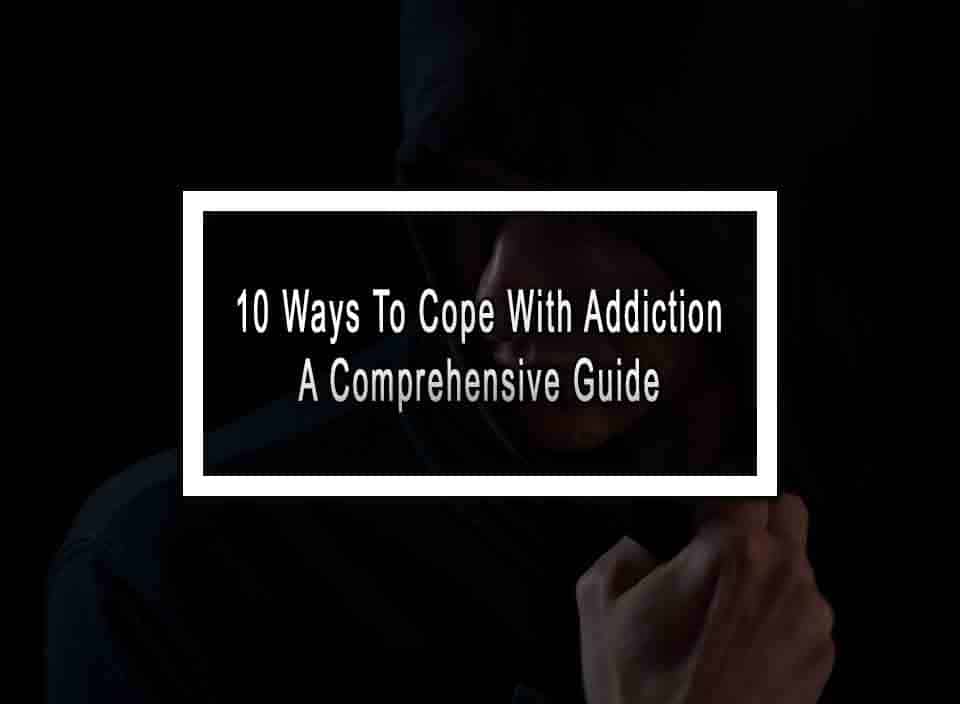Table of Contents
ToggleCope With Addiction: Unveiling Tips for a Healthier Recovery
Ways To Cope With Addiction – Oh, addiction! It’s a challenging battle that affects millions of lives around the globe. If you or someone you know is struggling with addiction, know that you are not alone. In this helpful guide, we’ve compiled ten practical and effective strategies to help you cope with addiction. From self-care practices to seeking professional help, we’ve got you covered. Let’s embark on a transformative journey towards a healthier, more fulfilling life.
1. Admitting the Problem is the First Step
Acknowledging that you have an addiction is an important step in starting your healing journey. It takes bravery and strength to face reality head-on. By accepting your addiction, you open the door to a world of opportunities for recovery and growth.
2. Seek Support from Loved Ones
When battling addiction, support from loved ones can make all the difference. Surround yourself with understanding and empathetic individuals who can provide the emotional support you need. They can be friends, family members, or even support groups who share similar experiences.
3. Establish a Daily Routine
Implementing a daily routine helps create a sense of stability and purpose in your life. By focusing on a routine, you provide yourself with a clear direction and minimize unstructured time that could lead to triggers or unhealthy behaviors.
4. Make Self-Care a Priority
Self-care is crucial in your journey to recovery. Engage in activities that bring you joy, relaxation, and peace. This may include practicing mindfulness, engaging in hobbies, spending time outdoors, or simply pampering yourself with a bubble bath or a good book.
5. Exercise for Physical and Mental Well-being
Physical exercise not only helps improve your physical health but also boosts your mental well-being. Engaging in regular physical activity releases endorphins, reduces stress, and promotes a healthier lifestyle. Find an exercise routine that you enjoy and make it a part of your recovery plan.
6. Create a Supportive Environment
Your environment plays a significant role in your recovery journey. Surround yourself with positivity by removing triggers, creating a clean and organized living space, and surrounding yourself with inspirational quotes, art, or objects that motivate you.
7. Explore Therapy Options
Professional therapy can provide invaluable support during addiction recovery. Whether it’s individual counseling, group therapy, or specialized therapies like cognitive-behavioral therapy (CBT), therapy provides a safe space to explore root causes, learn coping mechanisms, and develop strategies for long-term sobriety.
8. Practice Mindfulness and Meditation
Mindfulness and meditation offer effective tools for managing cravings, stress, and anxiety. Regularly practicing these techniques can help you develop greater self-awareness, and emotional regulation, and find inner peace amidst the challenges of addiction recovery.
9. Set Realistic Goals
Setting realistic and achievable goals helps provide a roadmap for your recovery journey. Break down larger goals into smaller, manageable steps to maintain motivation and celebrate each milestone along the way.
10. Stay Committed to Yourself
Addiction recovery is a lifelong journey. Stay committed to yourself, your health, and your well-being. Embrace challenges as opportunities for growth and never lose sight of the progress you’ve made. Celebrate your victories, no matter how small, and remember that you are capable of achieving a better, sober future.
Conclusion
Ways To Cope With Addiction – As you reach the end of this comprehensive guide, we hope you feel empowered and ready to take on the challenges that come with addiction recovery. Remember, conquering addiction takes time, patience, and a whole lot of self-love. By implementing these ten practical strategies, seeking support, and staying committed, you are paving the way for a happier and addiction-free life. Embrace the journey, believe in yourself, and never forget that there is always hope for a brighter future.
Cope With Addiction FAQ
Here are the most common questions about coping with addiction.
1. How can I tell if I or someone I know has an addiction?
Some signs of addiction include an inability to control substance use, cravings, neglecting responsibilities, withdrawal symptoms when attempting to quit, continued use despite negative consequences, and tolerance (needing higher amounts to achieve the same effect).
2. How can I support someone struggling with addiction?
Supporting someone struggling with addiction involves being understanding, non-judgmental, and empathetic. Encourage them to seek professional help, provide emotional support, and educate yourself about addiction to better understand their experiences. Avoid enabling their behavior and promote healthy boundaries.
3. Is addiction curable?
While addiction may not be completely curable, it is treatable. With the right support, treatment, and lifestyle changes, recovery is possible. Many individuals successfully manage their addiction and live fulfilling lives in long-term recovery.
4. Can I recover from addiction alone, without professional help?
While some individuals may be able to overcome addiction without professional help, it is generally recommended to seek professional support. Addiction is a complex disease that often requires specialized treatment and therapy to address underlying factors and develop effective coping strategies.
5. Can addiction relapse occur after recovery?
Yes, addiction relapse is possible even after a period of recovery. It is important to understand that recovery is a lifelong process, and relapse does not mean failure. Relapse should be seen as an opportunity to reassess treatment approaches, strengthen support systems, and make necessary adjustments to promote long-term recovery.
6. Where can I find help for addiction?
There are various resources available for addiction help, including addiction helplines, support groups (such as Alcoholics Anonymous or Narcotics Anonymous), counseling centers, rehab facilities, and mental health professionals. Additionally, online platforms often provide access to information, forums, and resources for addiction recovery.











